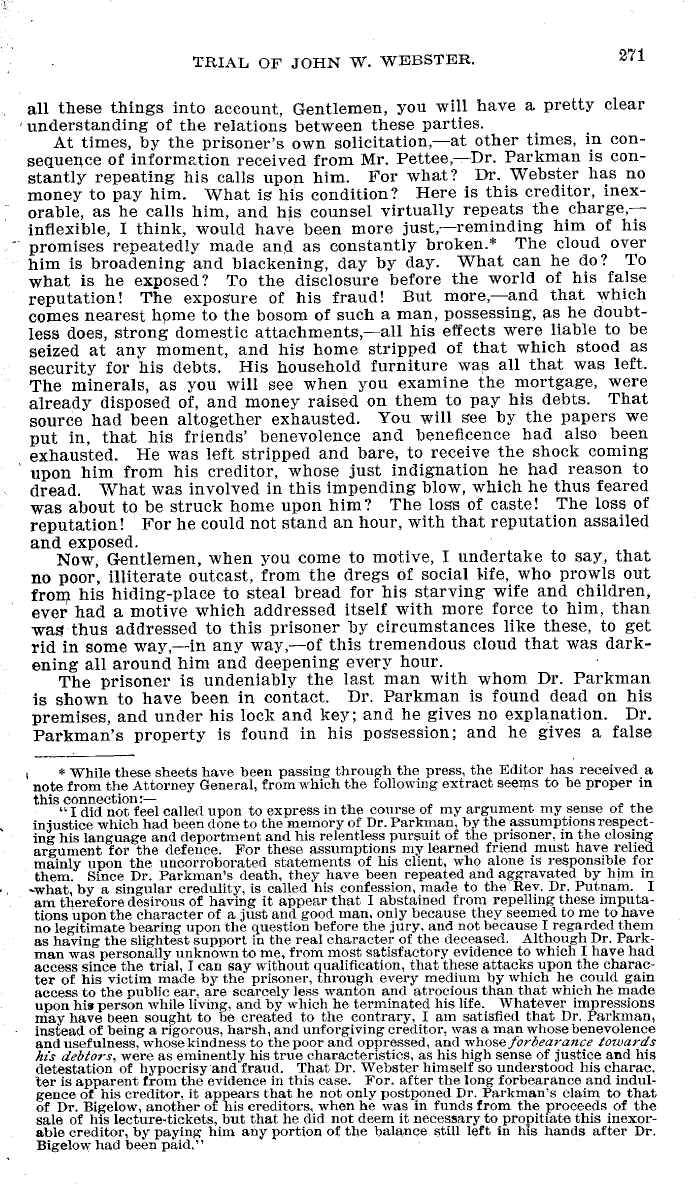|
TRIAL OF JOHN W. WEBSTER. 271
all these things into account, Gentlemen, you will have a pretty clear
understanding of the relations between these parties.
At times, by the prisoner's own solicitation,-at other times, in con-
sequence of information received from Mr. Pettee,-Dr. Parkman is con-
stantly repeating his calls upon him. For what? Dr. Webster has no
money to pay him. What is his condition? Here is this creditor, inex-
orable, as he calls him, and his counsel virtually repeats the charge,-
infiexible, I think, would have been more just,-reminding him of his
promises repeatedly made and as constantly broken.* The cloud over
him is broadening and blackening, day by day. What can he do? To
what is he exposed? To the disclosure before the world of his false
reputation! The exposure of his fraud! But more,-and that which
comes nearest home to the bosom of such a man, possessing, as he doubt-
less does, strong domestic attachments,-all his effects were liable to be
seized at any moment, and his home stripped of that which stood as
security for his debts. His household furniture was all that was left.
The minerals, as you will see when you examine the mortgage, were
already disposed of, and money raised on them to pay his debts. That
source had been altogether exhausted. You will see by the papers we
put in, that his friends' benevolence and beneficence had also been
exhausted. He was left stripped and bare, to receive the shock coming
upon him from his creditor, whose just indignation he had reason to
dread. What was involved in this impending blow, which he thus feared
was about to be struck home upon him? The loss of caste! The loss of
reputation! For he could not stand an hour, with that reputation assailed
and exposed.
Now, Gentlemen, when you come to motive, I undertake to say, that
no poor, illiterate outcast, from the dregs of social life, who prowls out
from his hiding-place to steal bread for his starving wife and children,
ever had a motive which addressed itself with more force to him, than
wag thus addressed to this prisoner by circumstances like these, to get
rid in some way,-in any way,-of this tremendous cloud that was dark-
ening all around him and deepening every hour.
The prisoner is undeniably the last man with whom Dr. Parkman
is shown to have been in contact. Dr. Parkman is found dead on his
premises, and under his lock and key; and he gives no explanation. Dr.
Parkman's property is found in his possession; and he gives a false
i * While these sheets have been passing through the press, the Editor has
received a
note from the Attorney General, from which the following extract seems to
be proper in
this connection:-
"I did not feel called upon to express in the course of my argument my
sense of the
injustice which had been clone to the memory of Dr. Parkman, by the
assumptions respect-
ing his language and deportment and his relentless pursuit of the prisoner,
in the closing
argument for the defence. For these assumptions my learned friend must have
relied
mainly upon the uncorroborated statements of his client, who alone is
responsible for
them. Since Dr. Parkman's death, they have been repeated and aggravated by
him in
what, by a singular credulity, is called his confession, made to the Rev.
Dr. Putnarn. I
am therefore desirous of having it appear that I abstained from repelling
these imputa-
tions upon the character of a just and good man, only because they seemed
to me to have
no legitimate bearing upon the question before the jury and not because I
regarded them
as having the slightest support in the real character of the deceased.
Although Dr. Park-
man was personally unknown to me, from most satisfactory evidence to which
I have had
access since the trial, I can say without qualification, that these attacks
upon the charac-
ter of his victim made by the prisoner, through every medium by which he
could gain
access to the public ear, are scarcely less wanton and atrocious than that
which he made
upon his person while living, and by which he terminated his life. Whatever
impressions
may have been sought to be created to the contrary, I am satisfied that Dr.
Parkman,
instead of being a rigorous, harsh, and unforgiving creditor, was a man
whose benevolence
and usefulness, whose kindness to the poor and oppressed, and whose
forbearance towards
his debtors, were as eminently his true characteristics, as his high sense
of justice and his
detestation of hypocrisy and fraud. That Dr. Webster himself so understood
his charac.
ter is apparent from the evidence in this case. For. after the long
forbearance and indul-
gence of his creditor, it appears that he not only postponed Dr. Parkman's
claim to that
of Dr. Bigelow, another of his creditors, when he was in funds from the
proceeds of the
sale of his lecture-tickets, but that he did not deem it necessary to
propitiate this inexor-
able creditor, by paying him any portion of the balance still left in his
hands after Dr.
Bigelow had been paid.
|

